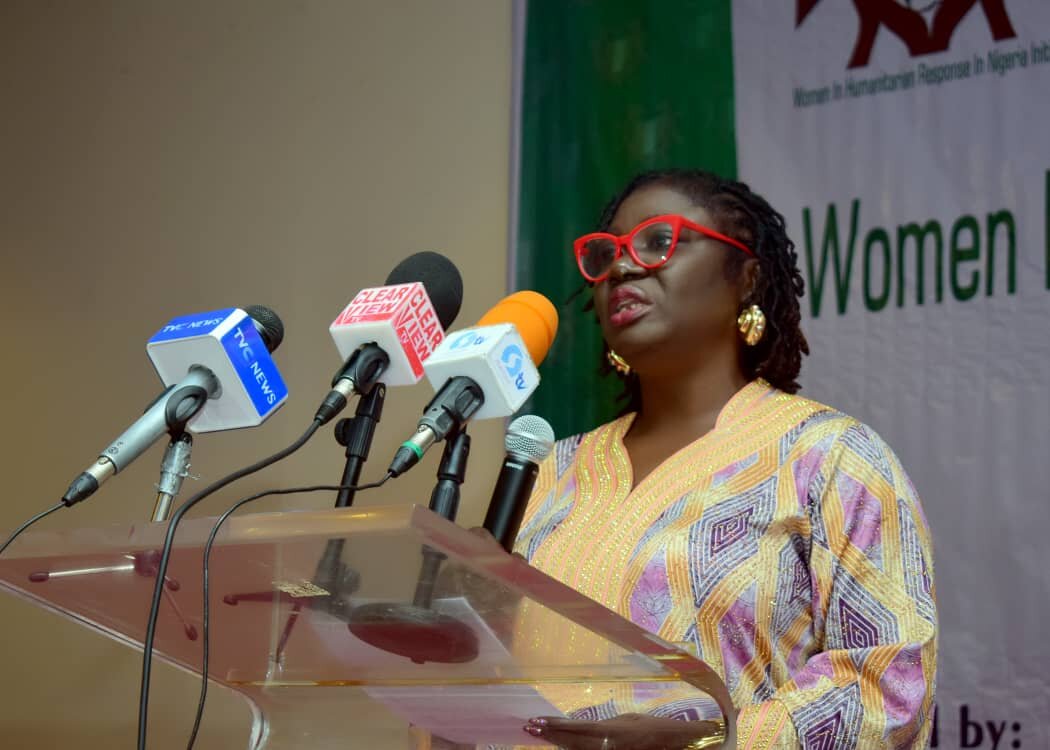Women-led responses to COVID-19: Report from Abuja, Nigeria
Women’s organisations around the world report COVID-19 and the urgent action they’re taking to protect their communities:
Mimidoo Achakpa leads the Women in Humanitarian Response in Nigeria Initiative Network. The Network was established by women-led organisation in Nigeria. The coalition of organisations is working together to ensure women’s leadership in humanitarian response and in localization processes, and to enhance the capacity of women-led civil society organisations for effective and efficient response to humanitarian emergencies in Nigeria.
Mimidoo reports from Abuja, Nigeria, where she is working from home.
Members of the Women in Humanitarian Response in Nigeria Initiative Network.
The latest on the pandemic here is that Nigeria has been in lockdown since Sunday 29th March. A presidential committee has just been set up by the government in response, but the Minister for Gender wasn’t included, even though women and children make up more than 60% of the Nigerian population.
In Abuja, the government has opened isolation centres for COVID-19 cases, but people in the community are really scared. At first, many people thought that religion would help to protect them from the virus, but the seriousness of the situation has really hit home. Downtown, people are really taking precautions - even before the lockdown I saw everybody wearing masks and gloves, and observing social distancing. We’ve seen lots of community groups coming together to provide mutual support for one another, such as distributing food and other essential items.
The response from the police has been a big problem - the way I see it - for them, ‘enforcement’ means aggression. There have been allegations of a man beaten to death by security personnel as he went to buy medicine for his wife. Since the lockdown I’ve been harassed when going out in public - even though I was clearly dressed for exercise, which is permitted - personnel tried to intimidate me into staying home. Intimidation isn’t the right way to deal with the lockdown. Security actors need to be briefed properly on how to speak to people to encourage them to stay home, by educating them about why it’s for their own good.
Myself and my colleagues recognised the need to take measures to stop the spread of COVID-19, so we decided to work from home a week before the lockdown started.
We’ve been working on campaigns with the Minister for Women and Children on how to protect your family from the virus, and we’ve produced educational radio jingles in the 3 national languages of Nigeria. However, there’s a real lack of resources that limits what we can do in response to the virus.
We were going to do a food and medicine distribution to every household - we even have the network in place to do so - but we just don’t have the resources needed yet. Weak internet connections are proving another challenge to working from home!
Women have been hit hard by the lockdown, as they are the caregivers in Nigerian society. The pandemic has had an economic, social and cultural impact on women.
Mimidoo Achakpa
Many women in Nigeria make a living from market trading - yesterday I saw a woman have the vegetables she was selling confiscated by the police. How can she afford to feed her children, if she can’t sell produce? It’s difficult as women are now confined at home so they aren’t able to socialise with their peers. Culturally, the patriarchal structure of Nigerian society means that women are left out of politics because it’s seen as ‘a man’s world’ - this means we’re not involved in the decisions that affect us directly.
I’m most concerned about the IDP camps. People there are at high risk of transmission because of the unhygienic conditions and the lack of access to medical care. We know that sexual and gender-based violence and menstrual hygiene are already a daily struggle for women and girls, and this will likely get worse with the lockdown. Isolation centres with medical personnel need to be set up to serve the populations living in the IDP camp, but we don’t know if any provisions are in place.
COVID-19 Nigerian National Response Inter-Ministerial action excluded the Ministry of Women Affairs and Social Development as currently constituted.
Women hold society together and many are breadwinners and the economic force of many homes. COVID-19 is no exception.
Inclusion of the Ministry of Women will synergize angles on social development and home-front issues of salience with our response efforts. Women are natural coordinators and should be included for more robust and effective outcomes in this pandemic.
COVID-19 is a global threat, and we need to work together to stop the spread - governments, the private sector, civil society and the humanitarian system.
The Feminist Humanitarian Network is working to facilitate shared learning and support amongst its members on the frontlines of the response to COVID-19 in countries around the world. To join or support the FHN, please email contact@feministhumanitariannetwork.org


